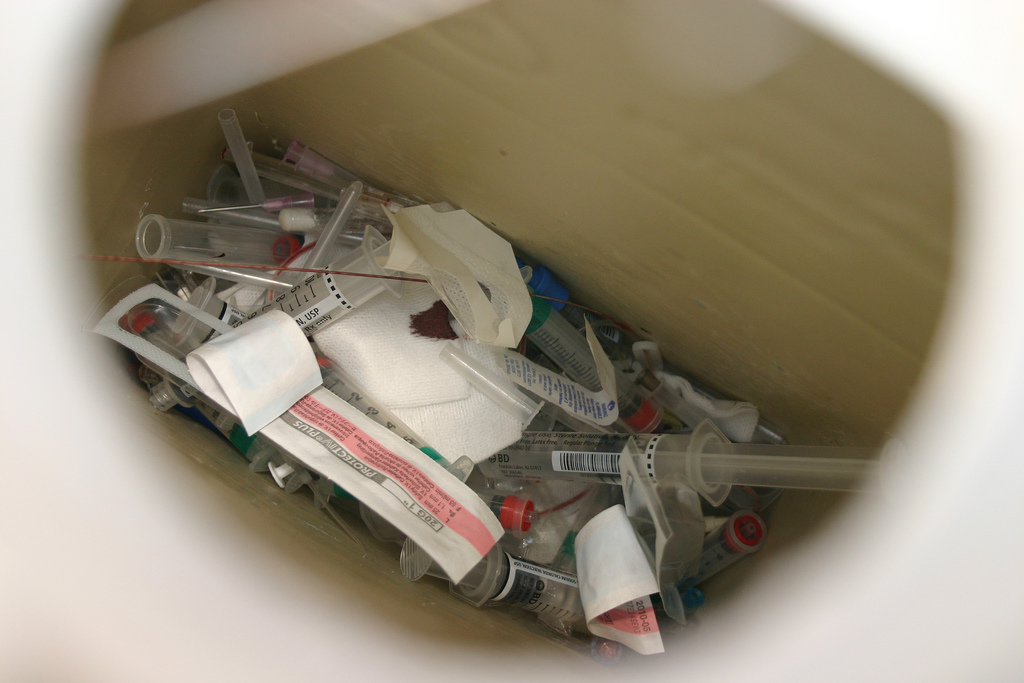What to Do When You Come Across Medical Waste

Do you know what steps to take when you come across medical waste? Though there are laws mandating proper handling and disposal of medical waste, there is a chance you may encounter it. Medical waste is generated from provision of healthcare; it is a biohazard, harmful to life. You can contract diseases from medical waste, unless you perform preventive steps to reduce the chance of infection.
Despite measures to prevent untreated medical waste from ending up in the environment, some of it still ends up near or within human habitat. If you encounter it, perform all of the following steps.
Step 1: Identify
The first thing you need to know is how to identify medical waste. Almost all institutions perform steps that readily identify biohazardous waste from municipal waste. Laws require containment of biohazardous waste exclusively in red bags or in containers labeled conspicuously with biohazard labels and warnings. These containers are not hard to miss.
Syringes, intravenous lines with blood, empty or opened vials, or things like a human arm, foot or other anatomical body part, carcasses of lab rats, rabbits, or guinea pigs are obvious medical waste.
Step 2: Keep your distance, or if touched, wash all exposed skin with soap and running water or disinfectant
If you happen to spot suspected medical waste at a distance, do not venture any closer. Uncontained biohazardous waste tends to contain body fluids that may harbor infectious microorganisms that cause disease. Because it is liquid, it may contaminate the surrounding ground, so it is wise to keep your distance. Do not go for a closer look at suspected medical waste.
If you’ve happened to enter the contaminated area or touched any waste or soil, there is a chance of contamination. Immediately wash all exposed skin with soap and running water. If water and soap is not readily available, use a disinfectant and wash later. If contact has been particularly close, a change of clothes is strongly advised.
If you’ve sustained splashes to the eyes, immediately flush clean and lukewarm water over your eyes for at least 20 minutes. Then wash your hands and seek emergency medical help.
What to do if you’ve sustained cuts or puncture injuries
Medical waste may include discarded sharps such as used needles and scalpels. To reduce risk of injury, most generators pack sharps in puncture- and spill-proof containers. But if through accidental exposure you sustained a wound (scrape, cut or puncture injury) due to contact with medical waste, do not waste time finding the culprit. Though the wound may become bloody, avoid stanching the bleeding in order to eliminate any germs that may have entered. Then wash the wound with lots of water and soap, and apply an antiseptic. Go to a hospital for further medical attention immediately.
Hospitals readily admit and treat injuries caused by sharps, especially in cases due to contact with medical waste. Blood tests will be done to check your body for the presence of pathogens, notably those that are blood-borne. Meanwhile, you may be given vaccines and immunoglobulin shots for hepatitis B and tetanus.
If your contact with medical waste is deemed particularly risky, an HIV test will be given and an HIV post-exposure prophylaxis program will be prescribed. Post-exposure prophylaxis is a preventive treatment given in order to prevent infection by the pathogen. You will need to be tested for HIV again six months after the injury. Meanwhile, you must practice safe sex and avoid donating blood until all tests are clear.
Step 3: Report
Most states have strict guidelines for the handling and disposal of biohazardous waste, and pay close attention to any incidents of its improper handling and disposal. If you’ve encountered or witnessed improper disposal of medical waste, you should report your findings to a state environmental enforcement agency.
Step 4: Get medical attention, and be aware
You can contract serious illnesses from medical waste depending on the degree and duration of exposure. Make sure to receive medical attention at a clinic or hospital following an encounter with medical waste. (Be aware that some of these illnesses may elicit signs and symptoms long after exposure to the pathogen.) Seek medical help immediately if you feel sick or have any symptoms such as fever, cough or vomiting.